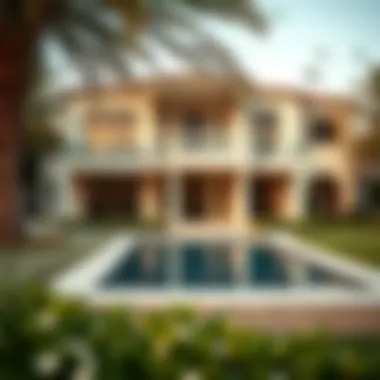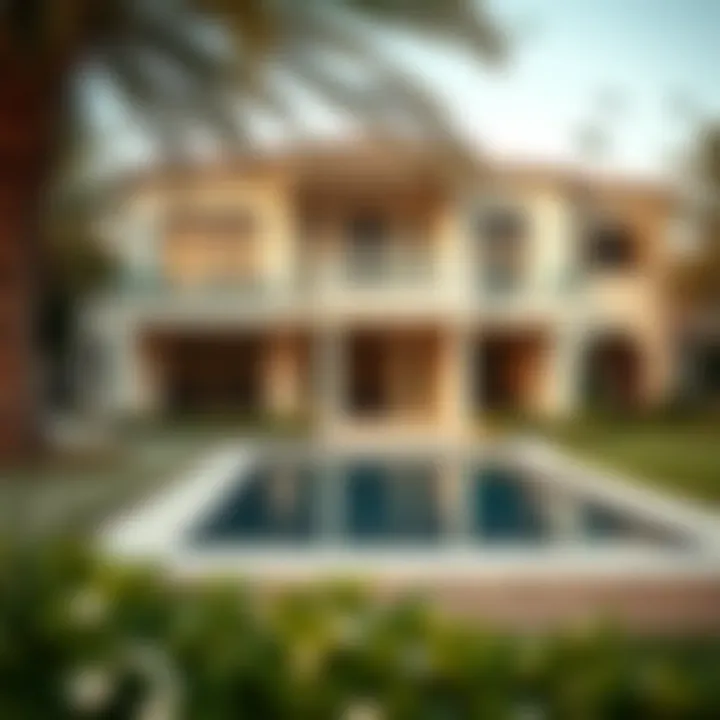Dubai Families: Insights on Living and Investing


Intro
Dubai, a gem nestled within the Arabian Peninsula, has transformed into a thriving metropolis, attracting families from all corners of the globe. The vibrant tapestry of cultures, coupled with a dynamic economy, positions Dubai as an attractive destination not just for work, but also for family life. Living here means engaging with a unique blend of tradition and modernity, making it essential for families to have a solid understanding of various facets including housing, educational institutions, community dynamics, and investment opportunities.
This article endeavors to provide a thorough exploration of family life in Dubai, and offers invaluable insights for homebuyers, investors, agents, developers, and expatriates. From understanding the latest trends in the real estate market to identifying high-return areas for property investment, this guide aims to navigate the complexities of living and investing in the Emirate.
By diving deep into community resources and educational systems available to expatriate families, we highlight essential elements that contribute to a well-rounded family lifestyle. We also take a closer look at the benefits and challenges that come with living in this cosmopolitan city.
With an increasing number of families looking to call Dubai home, it's crucial to equip them with the right knowledge and insights. So, let’s embark on this journey to uncover what makes family life in Dubai not only possible but highly rewarding.
Understanding the Family Demographic in Dubai
Understanding the family demographic in Dubai is pivotal for grasping the unique tapestry of social interactions and lifestyle choices in the Emirate. With a significant portion of the population being expatriates, the nuances of family life here differ vastly from Western norms and traditions. Therefore, comprehending this demographic shift plays a critical role for investors, homebuyers, agents, and developers looking to cater to these diverse family needs. It also helps in shaping community services, educational frameworks, and housing proposals tailored to the family-centric market.
Overview of Expatriate Families
Dubai’s landscape is a melting pot of cultures, housing families from various backgrounds. Expatriate families often find themselves balancing traditional values from their home countries while adapting to the dynamic lifestyle of the Emirate. This blending can lead to rich, multicultural experiences but also presents its own set of challenges.
Families hail from countries like India, the Philippines, the UK, and many others. Each brings its distinct flavor to daily life, influencing everything from dining choices to family entertainment. For instance, an Indian family might prioritize community-centric events while a Western family might seek organized recreational activities that promote a relaxed lifestyle.
It’s important to recognize that these families often share a common goal: providing a safe, nurturing environment for their children while maintaining their cultural identities. Investors and homebuyers need to be aware that many expatriate families value proximity to international schools, parks, and family-friendly facilities when choosing neighborhoods.
Cultural Diversity and Its Impact
Cultural diversity in Dubai has far-reaching implications for family life and investment opportunities in the real estate sector. This multicultural backdrop fosters a sense of community, where families celebrate different festivals and cultural events together. This is not just enjoyable; it’s a communal bonding experience that strengthens neighborhood ties.
On the flip side, this diversity can lead to challenges such as cultural miscommunications or varying views on parenting styles. Families may find themselves navigating these waters often, as they seek to blend their practices with those of their neighbors.
"Cultural integration is as key to successful family life in Dubai as the bricks and mortar in real estate."
Moreover, this big mix of cultures affects business models across the board. Educators, community planners, and businesses must remain adaptive and sensitive to these cultural nuances when tailoring their approaches. For instance, schools often offer diverse curriculum choices, which appeal to families from different educational backgrounds.
Recognizing and embracing this cultural diversity not only allows families to flourish in this environment but also presents a wealth of opportunities for smart investors and developers. Tailoring offerings that cater to these unique circumstances can yield favorable results and return on investment.
Real Estate Trends for Families
The real estate landscape in Dubai not only shapes where families would call home but also greatly influences their lifestyle and well-being. Understanding these trends is crucial for anyone looking to invest in the family market of this dynamic city. Factors like accessibility, community amenities, and educational facilities have a direct impact on the choices families make. Beyond just a place to live, the right neighborhood offers a lifestyle that supports family needs. As families look for stability in a fast-paced environment, these elements play a pivotal role in their decision-making.
Popular Neighborhoods for Families
Dubai Marina
Dubai Marina stands out as one of the prime choices for expatriate families. This neighborhood is built around a scenic man-made marina, offering a lifestyle that blends luxury with convenience. The proximity to the beach and various parks makes it suitable for families that crave an active lifestyle.
- Key Characteristic: High-rise apartments with stunning views.
- Why It's a Popular Choice: With its upscale restaurants, shopping, and leisure options, Dubai Marina caters to modern family needs.
- Unique Feature: The Marina Walk, which provides a scenic route for walks, cycling, and running, promotes healthy living.
- Advantages/Disadvantages: While the area is vibrant and highly desirable, the costs can be on the higher side, which might stretch some family budgets.
Jumeirah
Jumeirah is a well-established area that exudes a unique charm, blending traditional Arabian elements with modern conveniences. Known for its spacious villas and proximity to several private beaches, it's an appealing choice for larger families.
- Key Characteristic: Spacious villas and a family-friendly environment.
- Why It's a Popular Choice: The area boasts multiple international schools, playgrounds, and numerous parks, making it attractive for families seeking stability.
- Unique Feature: Jumeirah Beach, which offers a relaxing escape within the city itself.
- Advantages/Disadvantages: Although it offers a more tranquil atmosphere, property prices are generally high, which could limit options for some families.
Arabian Ranches
For families looking for suburban life, Arabian Ranches provides a peaceful oasis away from the city's frenetic pace. With a range of designer villas, this community is known for its spacious layouts and beautiful surroundings.
- Key Characteristic: Gated community focused on family living.
- Why It's a Popular Choice: The presence of parks, cycling paths, and a golf course positions it as an ideal spot for outdoor enthusiasts.
- Unique Feature: The community centers that provide recreational activities for children and adults.
- Advantages/Disadvantages: While it offers wide-open spaces and a family-oriented design, it can be farther from the city's heart, which may be a drawback for some.
Luxury Living Options
Villas and Townhouses
The villa and townhouse options in Dubai cater excellently to families needing both space and luxury. These residences often come with gardens and community amenities that promote a healthy, vibrant lifestyle for children.
- Key Characteristic: Spacious designs that accommodate families.
- Why It's a Popular Choice: Families appreciate the comfort and privacy these homes offer, along with community facilities like play areas and swimming pools.
- Unique Feature: Many compounds provide security, making it a worry-free environment for families.
- Advantages/Disadvantages: While they provide ample space, the cost can be prohibitive, especially in central areas.
Luxury Apartments
Luxury apartments in Dubai stand as a great option for families looking for modern comforts without compromising on convenience.
- Key Characteristic: High-end finishes and multi-purpose layouts.
- Why It's a Popular Choice: These apartments often include easy access to community services, schools, and shopping centers.
- Unique Feature: Amenities such as rooftop pools, gyms, and entertainment spaces for families to bond.
- Advantages/Disadvantages: They allow for a lifestyle of ease and comfort, but larger families may find space constraints when compared to villas.
Affordable Family Housing
Suburban Areas


The suburban expanse of Dubai offers families affordable housing with a community feel. More spacious compared to urban centers, these neighborhoods are gaining traction among families.
- Key Characteristic: Affordable living with essential amenities.
- Why It's a Popular Choice: Families find it appealing due to lower costs and access to schools and parks.
- Unique Feature: Larger plots of land allow for outdoor activities and family gatherings.
- Advantages/Disadvantages: The trade-off is often a longer commute to the city’s main commercial districts.
Emerging Neighborhoods
Emerging neighborhoods in Dubai, such as Dubai South and Al Furjan, are also becoming favorable for families due to their rapid development and planning.
- Key Characteristic: New constructions that address family-oriented needs.
- Why It's a Popular Choice: As they develop, these areas present more budget-friendly options alongside modern infrastructures.
- Unique Feature: The promise of community-centrism with parks, schools, and retail spaces.
- Advantages/Disadvantages: Being in early stages of development can sometimes mean less established amenities, but that could also mean future growth and increased value.
Education Facilities for Families
Education in Dubai plays a pivotal role for families, serving as a foundation for both children's development and parents' peace of mind. With a diverse expatriate population, the educational landscape offers a rich tapestry of options, ensuring families can find a school that aligns with their values, goals, and curriculum preferences. The importance of education facilities goes beyond mere academic performance; they contribute significantly to a family’s overall experience in Dubai, influencing social connections and community integration.
International Schools Overview
Dubai boasts a multitude of international schools that cater to the varying needs of its expatriate families. These institutions are often equipped with modern facilities, experienced staff, and an inclusive environment that recognizes cultural diversity. The international schools typically follow different curricular models, making it easier for families from various backgrounds to choose a fitting educational pathway.
Some noteworthy features of the international schools in Dubai include:
- Multicultural Environments: These schools often host students from various nationalities, giving children the opportunity to learn alongside peers from different cultures.
- Extracurricular Activities: Many international schools emphasize a well-rounded education, offering a wide array of extracurricular activities, such as sports, arts, and technology clubs, enhancing children's personal growth.
- Advanced Facilities: Schools tend to come with state-of-the-art libraries, laboratories, and classrooms equipped with the latest technology, providing an enriched environment conducive to learning.
Curriculum Choices and Accreditations
When it comes to education, families in Dubai can choose from various curricula tailored to fit different educational philosophies and future aspirations. Understanding the choices available helps families make informed decisions that best suit their children's needs.
British Curriculum
The British Curriculum is renowned for its structured approach and focus on critical thinking and problem-solving. This system is characterized by a clear progression from the Early Years Foundation Stage to GCSEs, leading to A-levels, which are highly regarded by universities worldwide.
Key Characteristics:
- Emphasis on Depth of Knowledge: Students dive deep into subjects, fostering a thorough understanding rather than just rote memorization.
- Recognition of GCSEs and A-Levels: These qualifications are recognized globally, making it easier for students to transition to universities abroad.
- Assessment Method: Regular assessments ensure that students are kept on track, identifying areas needing improvement early.
Advantages and Disadvantages:
- Advantages: Comprehensive assessment, fostering independent thinking; suitable for students planning to continue education in the UK.
- Disadvantages: The pressure for high-stakes testing can sometimes overwhelm younger students.
American Curriculum
The American Curriculum offers a flexible approach to education, placing emphasis on student choice and personalization. Students can take Advanced Placement courses which could earn them college credits while still in high school.
Key Characteristics:
- Diverse Elective Options: Students can explore a wide range of subjects, including arts, languages, and sciences.
- Holistic Learning: Focus is placed not just on academics, but also on emotional and social growth through support programs and counseling.
- Adaptability: The curriculum can be adjusted to fit individual learning styles, responding to students’ unique needs.
Advantages and Disadvantages:
- Advantages: Flexibility and adaptability cater to various student learning styles; recognized by many higher education institutions.
- Disadvantages: May lack the rigorous structure some families prefer, leading to varied academic outcomes.
IB Programs
The International Baccalaureate (IB) Programs are distinguished by their global perspective and strict academic rigor, designed to foster critical thinking in a worldwide context. The IB Diploma Programme is particularly sought after as it encourages depth and breadth of learning.
Key Characteristics:
- Interdisciplinary Learning: Encourages connections between subjects through projects and shared themes.
- Community Engagement: The curriculum includes community service as a key component, promoting civic responsibility.
- Global Perspective: The curriculum is designed with an international mindset, preparing students for an interconnected world.
Advantages and Disadvantages:
- Advantages: Highly regarded by universities worldwide; promotes bilingualism and global citizenship.
- Disadvantages: Intense workload that may not be suitable for every student; complexity of the curriculum can be challenging to navigate.
In summary, choosing the right education facility is paramount for families living in Dubai, impacting not only academic paths but also social integration and community involvement. A thorough understanding of the available curricula can significantly enhance the educational experience, making it a critical consideration for families relocating to the Emirate.
Healthcare Options for Families
In Dubai, healthcare options play a crucial role in shaping the overall family experience. A robust healthcare system is essential for expatriate families who prioritize the well-being of their loved ones. This section delves into the differences between public and private healthcare facilities, the availability of pediatric specialists, and the reliability of emergency services.
Public vs. Private Healthcare
Dubai's healthcare system is a mix of public and private facilities, each with its own distinct advantages and disadvantages. Public hospitals, while generally offering lower fees, often experience longer wait times and limited services compared to their private counterparts. Families looking to save on healthcare expenses may initially lean towards public facilities. However, they might find that the trade-off includes more crowded situations and sometimes less personalized care.
On the other hand, private healthcare in Dubai is renowned for its high quality and efficiency. These institutions often provide shorter waiting times and a wider range of specialized services. Families might find that private healthcare facilities align better with their expectations, especially when urgent health issues arise or specialized care is needed. Overall, the choice between public and private healthcare comes down to balancing cost with the level of care required.
Healthcare Facilities for Children
Families residing in Dubai take comfort in the availability of specialized healthcare services catering to children. This encompasses access to pediatric specialists and emergency services specifically designed with children’s needs in mind.


Pediatric Specialists
Pediatric specialists are crucial to ensuring that children receive age-appropriate health care. These professionals focus on diagnosing and treating a range of conditions that affect younger patients, including developmental disorders and acute illnesses. One key characteristic of pediatric specialists is their ability to connect with children, easing their anxiety during medical assessments.
This includes a wide array of treatments, from routine vaccinations to complex therapies for chronic conditions. Families often opt for pediatric specialists because they offer a tailored approach, emphasizing preventive care and developmental tracking. The unique feature that sets pediatricians apart is their training in the specifics of children’s health, which means that they are equipped with the knowledge necessary to deal with issues that are not typically encountered in adult medicine.
Advantages of choosing specialized pediatric care include a focused environment where children feel secure and understood. However, parents must consider that these services sometimes come at a premium price compared to general healthcare options.
Emergency Services
Emergency services are another critical component in the healthcare landscape for families in Dubai. These services encompass rapid response units and emergency rooms that are equipped to handle various situations, from accidents to life-threatening conditions.
The key characteristic of emergency services in Dubai is their widespread availability and responsiveness. Most facilities feature dedicated pediatric emergency rooms, ensuring specialized care for younger patients during crises. Families can feel reassured knowing that expert help is just a phone call away, available 24/7 throughout the city.
A standout feature of these emergency services is their integration with an advanced technology system, which facilitates quick diagnosis and treatment. Families relying on these services benefit from well-trained staff accustomed to high-stress situations and making split-second decisions. However, it is worth noting that costs for utilizing emergency services can mount quickly, potentially leading to financial strain.
Cost of Living for Families in Dubai
The cost of living in Dubai is a crucial aspect for families, especially expatriates moving to this vibrant metropolis. Understanding the financial commitments involved helps families manage their budgets effectively and enables informed decisions about housing, education, and lifestyle choices. Each cost component plays a significant role in the daily lives of residents, impacting everything from comfort to educational opportunities for children.
Housing Costs
Housing costs in Dubai can drastically vary. Families can find everything from luxurious villas to budget-friendly apartments, which means potential homeowners or renters must do their homework.
- Rental Prices: Rental prices in well-established neighborhoods like Dubai Marina and Jumeirah can be steep, often requiring a substantial portion of a family's income. Nevertheless, there are affordable options in areas such as Dubai Investment Park and Al Qusais, which can be appealing for families seeking balance between cost and convenience.
- Buying vs. Renting: Families often weigh the pros and cons of buying versus renting. Buying property in Dubai can be a smart investment, especially with the emirate's growing appeal among expatriates. Yet, high upfront costs can be a barrier. For those who prefer flexibility, renting may suit their lifestyle better, particularly in the first few years of settling down.
In summary, housing costs can eat up a large chunk of the family budget, making it essential to explore all available options.
Other Living Expenses
Utilities
Utilities in Dubai, which include electricity, water, and internet, can be a headache or a breeze depending on the choices families make. The emirate is known for its hot climate, leading to higher electricity costs during the warm months. On average, families might see their utility bills hover around 800 to 1,500 AED per month.
- Energy-Efficient Homes: Families can mitigate some costs by choosing energy-efficient homes or utilizing energy-saving practices, like using LED lighting or optimizing air conditioning usage. This is not only a money-saver but also a step toward sustainability, something increasingly valued in urban living.
- Internet Costs: Another consideration is the rapidly evolving digital landscape requiring reliable internet. Families might need to budget an additional 300 AED for a decent plan, which varies according to speed and provider.
Groceries
Grocery shopping in Dubai offers a variety of choices from high-end supermarkets to local markets, and prices can vary widely. A family of four might spend about 1,500 to 2,500 AED monthly depending on dietary needs and preferences.
- Shopping Venues: For those looking to keep costs down, discount chains like Carrefour or LuLu Hypermarket combined with local souks can provide better deals than upscale stores. On the flip side, if convenience is paramount, Western brands might be more your speed, albeit at a premium.
- Imported Goods: It’s important to note that prices can spike for imported goods, especially fresh produce out of season. Thus, being savvy about seasonal products can greatly affect the grocery bill.
Transportation
Transportation is another expense that families cannot overlook, particularly with Dubai's sprawling layout. Many families rely on personal vehicles, which can lead to notable costs in fuel and maintenance. Fuel prices remain relatively low compared to other global cities, yet the ongoing expenses can add up.
- Public Transport: For those who prefer not to own a car, Dubai boasts an efficient metro system and bus network which can significantly reduce commuting costs. Monthly passes and Nol cards can save families money, turning public transport into a wise investment, especially during peak traffic hours.
- Ride-Hailing Services: Alternatively, ride-hailing services such as Careem and Uber have gained popularity, offering ease at a price. While they can be convenient for occasional use, the costs accumulate quickly if relied upon daily.
Family-Friendly Activities
In the vibrant tapestry of Dubai, family-friendly activities hold a significant place. For expatriates, these activities allow families not only to bond with each other but also to connect with the community around them. Engaging in wholesome recreation develops children's social skills, encourages outdoor activities, and helps them adapt to the diverse cultures prevalent in this cosmopolitan city. Moreover, these activities are a linchpin for families considering a move to Dubai, as they directly affect the quality of life and family cohesion.
Cultural and Recreational Venues
Dubai Parks and Resorts
One of the key attractions for families in Dubai is Dubai Parks and Resorts. This sprawling entertainment complex is made up of various theme parks, including Motiongate Dubai, Bollywood Parks Dubai, and Legoland Dubai. It easily becomes a one-stop hub for fun-filled family outings, where amusement meets culture and creativity. What sets Dubai Parks and Resorts apart is its vast range of rides and attractions designed for different age groups. From thrilling roller coasters for the daredevils to gentle rides for the little ones, there's something for everyone.
A unique feature of Dubai Parks and Resorts is its emphasis on themed experiences based on popular cinema, which creates unforgettable interactions for children and parents alike. However, families should consider the cost of entry, especially during peak seasons when prices can skyrocket. To get the best bang for your buck, planning a visit during off-peak times or looking for family packages is advisable.
Beaches and Outdoor Spaces
Dubai is renowned for its stunning beaches and outdoor spaces, making them a significant draw for families seeking leisure activities. Places like Kite Beach and Jumeirah Beach offer not just sun and sand but also a host of family-centric activities such as paddle boarding, volleyball, and water sports. One key characteristic of these beaches is their cleanliness and accessibility, which are crucial for families choosing recreational spots.
In addition to sandy shores, Dubai also boasts numerous parks like Al Barsha Park and Zabeel Park that provide expansive green areas for picnics, cycling, and playgrounds tailored for children. A unique element of these parks is their focus on community engagement through organized events and activities that often foster social connections among families.
However, it's important to note that the weather can be quite scorching, particularly during summer months. Families might find an early morning or late afternoon visit more enjoyable than mid-day outings.
Community Events and Programs
Community events are another cornerstone of family life in Dubai. These programs not only provide entertainment but also enrich social lives as families engage in various cultural exchanges. Seasonal festivals such as the Dubai Shopping Festival or National Day celebrations foster a sense of unity and shared experiences among expatriates and locals alike. Activities like open-air markets, art fairs, and cultural showcases often draw significant crowds, allowing families to explore local crafts and culinary delights together.
From movie nights in parks to sports days, community events help families to establish a network, easing the transition into a new culture. Engaging in these initiatives can enrich children's understanding and appreciation of diversity, making their overall experience in Dubai more meaningful.
"The best way to enjoy life in a new city is to immerse yourself in its community, and Dubai's family-friendly events make that easier than ever.”


In summation, family-friendly activities in Dubai play an essential role in shaping a fulfilling life for expatriate families. With plenty of recreational options available, alongside vibrant community events, families can find various ways to adapt and thrive in this extraordinary emirate.
Legal Considerations for Expat Families
Navigating the legal landscape in a new country can feel like trying to find your way through a maze. In Dubai, understanding the legal framework is crucial for expatriate families looking to settle down. The local laws govern various aspects of life here, from obtaining residence visas to home ownership. For families, having this knowledge can be the difference between feeling at home and living in daily uncertainty. Securing the right permits and understanding property laws not only makes life smoother but also provides peace of mind.
Residential Visas and Permits
To call Dubai home, expatriate families need to understand the ins and outs of obtaining a residential visa. The UAE offers different types of visas suited for various expat categories, including those sponsored by employers or family members. The process usually involves submitting important documents such as passports, photographs, and sometimes health screening certificates.
Moreover, families must consider the duration and renewal process of these visas.
- Key Points Related to Residential Visas:
- Employment Visa: This is the most common route, tied to job status.
- Family Visa: Allows spouses and children to live in Dubai, provided that the working parent meets salary requirements.
- Investor Visa: Options are available for those investing in property or businesses.
Once you have your visa, the next step involves obtaining an Emirates ID, which is essential for engaging in most activities—everything from getting a phone line to opening a bank account.
Property Ownership Laws
Understanding property ownership laws is essential for expatriate families thinking about making a long-term investment in Dubai. The UAE's property market is largely open to foreign investors, but there are regulations that one must heed. Some areas are designated as freehold where foreigners can own properties outright, while in other areas, only leasehold ownership is permitted.
Important Considerations Regarding Property Ownership:
- Freehold Areas: These include popular spots like Dubai Marina and Downtown Dubai, where expatriates can own the land and property.
- Leasehold Areas: Here, expatriates can lease land for up to 99 years but do not have ownership rights.
- Regulatory Bodies: The Real Estate Regulatory Agency (RERA) oversees compliance and protects buyers.
Before purchasing property, it’s advisable to consult with legal professionals familiar with local laws to avoid pitfalls. This knowledge ensures that families can invest without falling into legal traps. Knowledge truly is power when it comes to securing your family's future in this dynamic city.
"Understanding not just the letter of the law but also the spirit behind it can empower families to make informed decisions."
By grasping the legal considerations surrounding residency and property ownership, expatriate families can foster stability in their lives in the vibrant emirate of Dubai.
Challenges Faced by Families
In any urban setting, families encounter unique hurdles, and Dubai is no different. For expatriate families, these challenges can be particularly pronounced due to the intricate blend of cultural norms, economic fluctuation, and the educational landscape. Understanding these difficulties helps potential investors, homebuyers, and families make informed decisions about their future in the Emirate.
Cultural Adaptation
Cultural adaptation is a critical aspect of settling into a new environment. For families relocating to Dubai, the transition can be a mix of excitement and apprehension. The city boasts a rich tapestry of cultures, with a significant expatriate community alongside native Emiratis. This diversity is both a boon and a challenge. Families often find themselves navigating different social norms, communication styles, and lifestyle preferences which can, at times, be overwhelming.
For instance, some expatriate families may struggle with understanding local customs, like the importance of Ramadan, which can affect work schedules and public availability. Children might face challenges in adapting their social behaviors to fit in with peers from various backgrounds. It's essential for families to either engage with community groups or local cultural orientations that can provide insights and support during the initial adjustment phase.
Engaging with neighbors, attending community events, and fostering friendships with locals can enhance the cultural assimilation process. It is important to step outside the comfort zone and embrace the beautiful diversity that Dubai offers, making the journey of adaptation smoother.
Navigating the Education System
Education is a significant consideration for families, and in Dubai, this aspect presents its own set of complexities. The Emirate offers a plethora of private international schools, each with unique curricula, including British, American, and International Baccalaureate programs. However, the challenge lies in choosing the right school that aligns with a child's needs and family's values.
Families often must contend with high tuition fees, which can vary significantly from one institution to another. Moreover, the admissions process for many reputable schools is competitive, requiring early planning and sometimes even waiting lists. Different curricula come with their own sets of requirements and implications for future education, including university admission criteria.
Consider this when selecting a school:
- Does it offer your desired curriculum?
- How does it rank in terms of academic performance and student services?
- What are the extracurricular offerings available for your child?
"The right school can shape a child's future, but navigating the myriad options in Dubai requires diligence and foresight."
By doing thorough research and seeking advice from other expatriates or online forums, families can better understand how to navigate this complex educational landscape. Whether it’s through engaging parents' associations or online platforms like Reddit or Facebook groups, leveraging community knowledge is key to finding a suitable educational fit.
In all, while living in Dubai provides ample opportunities, families must address these cultural and educational challenges to fully unlock their potential and enjoy their experience in the Emirate.
Future Prospects for Families in Dubai
Dubai's trajectory of growth and development paints a favorable picture for families considering a life in this vibrant emirate. The future prospects for families in Dubai are intertwined with the expanding economy, urbanization efforts, and enhanced infrastructure. These elements create an environment conducive to raising families while also presenting numerous opportunities for investment. For expatriate families, understanding these prospects is not merely about lifestyle—it's a strategic consideration involving long-term plans for education, living conditions, and community engagement.
Economic Growth and Family Living
As the heart of the UAE, Dubai's economy is showing no signs of slowing down. With a diverse economic base that includes tourism, technology, and finance, the city has proven its resilience during turbulent economic times. Families residing in Dubai benefit from this economic stability; they find ample opportunities for employment in various sectors. Furthermore, businesses are eager to tap into the talent pool that expatriate families bring, leading to better job prospects, which ultimately enhance the quality of life.
Consider this:
- Increased Job Opportunities: Families moving to Dubai find themselves in a hub where jobs in a myriad of sectors are consistently available. This not only improves financial stability but also allows for better negotiating power in terms of family needs.
- Investment in Education: The economic growth translates into better facilities, resources, and programs within educational institutions. Families can expect access to a wide spectrum of international schools offering a range of curricula tailored to their children's needs.
- Cultural Exchange Opportunities: An economically vibrant Dubai fosters a rich tapestry of cultural interactions, enabling children to grow up in a multicultural environment, thus enhancing their social skills and global awareness.
"Dubai’s skyline is not the only thing that’s rising; the future of families in this city is equally promising," a local resident summarizes.
Urban Development Projects
Dubai's continuous urban development projects are not just about enhancing aesthetics; they are designed to improve the living conditions and amenities for families. With highly anticipated initiatives aimed at creating family-oriented urban spaces, the commitment of Dubai's leadership to family living is clear.
- Smart City Initiatives: Projects like Dubai's Smart City strategy are revolutionizing how families interact with their living environment. These projects focus on sustainability and accessibility, addressing needs from public transportation to green spaces. Families can look forward to a more efficient commute to work and school, promoting a healthier work-life balance.
- New Family-Centric Developments: Neighborhoods like Dubai Hills and Dubai Creek Harbour are examples of master-planned communities designed with families in mind. Built with parks, recreational areas, and community centers, they offer safe and nurturing environments for children.
- Infrastructure Enhancements: With improved public transport and road networks, new family projects are becoming easier to access. Consider how these projects also prioritize safety, a key concern for families considering relocation.
Ultimately, the emphasis on urban development in Dubai caters directly to families, ensuring that future living conditions remain appealing, sustainable, and practical.
In summary, for families considering settling in this emirate, developments in both economic growth and urban planning are trends deserving of close observation. The prospects here are not just promising; they resonate with a commitment to enhance the family living experience in a city that thrives on innovation and inclusivity.



